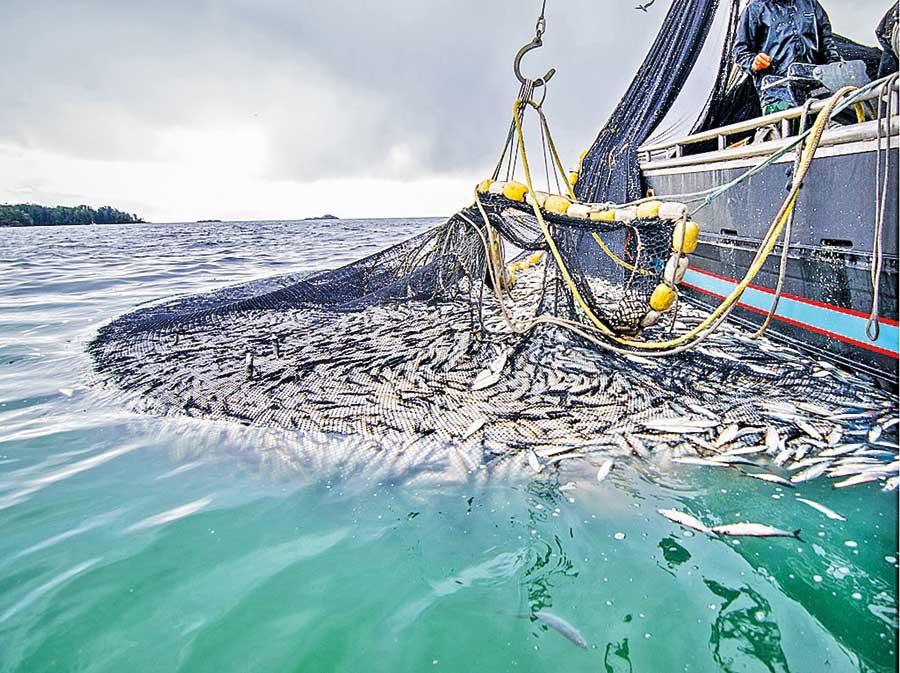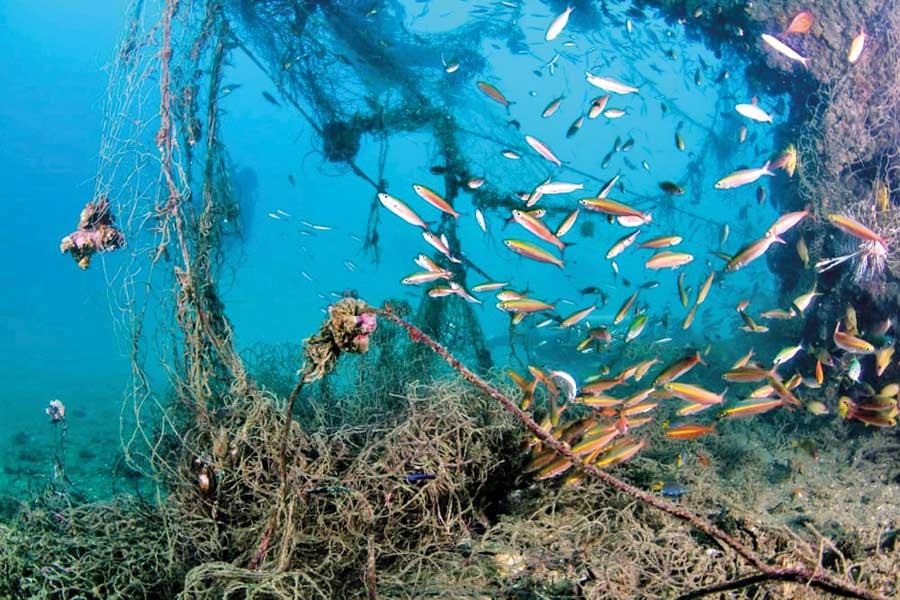04 Oct 2023 - {{hitsCtrl.values.hits}}

Local fishermen are heavily inconvenienced due to bottom trawling activities and as of now this has adversely affected their livelihood
The industrial practice of bottom trawling by Indian fishermen in Sri Lankan waters is a persistent problem that hasn’t ceased to date. Hence it has resulted in a failure by the authorities to protect the marine environment. This is despite the existence of a ban imposed against this disruptive fishing practice which has been effective since 2017. In addition to being illegal and detrimental to the environment such activities have not ceased. Such activities are carried out in violation of the International Maritime Boundary Line (IMBL), and also by causing irreversible damage to Sri Lanka’s maritime resources.
protect the marine environment. This is despite the existence of a ban imposed against this disruptive fishing practice which has been effective since 2017. In addition to being illegal and detrimental to the environment such activities have not ceased. Such activities are carried out in violation of the International Maritime Boundary Line (IMBL), and also by causing irreversible damage to Sri Lanka’s maritime resources.
According to statistics provided by Sri Lanka Navy and as of September 5 this year, 14 Indian fishing vessels and 93 Indian fishermen have been apprehended by the sea going force for engaging in bottom trawling activities in the island’s waters. Further statistics from previous years indicate how the practice has not completely ceased despite Sri Lanka’s ban on bottom trawling activities. Accordingly, 36 Indian fishing vessels and 264 Indian fishermen were arrested in 2022, whereas 30 fishing vessels and 243 Indian fishermen were apprehended by the Navy in 2021 for violating the law and engaging in disruptive fishing practices in Sri Lankan water territories. As much as this indicates a lack of regard for international maritime law, the situation also draws attention to the plight of local fishermen who are struggling to make ends meet due to the challenges faced by rival fishing groups arriving from India.
Approximately 1,000 Indian fishing trawlers arrive for a day and nearly three times a week and engage in poaching activities in our water territories. In addition to being left in a helpless situation, local fishermen avoid altercations with their Indian counterparts fearing damage to their fishing nets
- N. M. Alam Secretary and Media Spokesperson of the Mannar and Puttalam District Fishing Cooperative Unions
Local fishermen bear the brunt
While bottom trawling was initiated earlier by the Indian fishermen with the intent of harvesting shrimps, this has eventually led towards the harvest of sea cucumbers as well; thereby exploiting the fishing resources of Sri Lanka and depriving the local fishermen from generating income through sustainable fishing methods. “Local fishermen are heavily inconvenienced due to bottom trawling activities and as of now this has adversely affected their livelihood.
Approximately 1,000 Indian fishing trawlers arrive for a day and nearly three times a week and engage in poaching activities in our water territories. In addition to being left in a helpless situation, local fishermen avoid altercations with their Indian counterparts fearing damage to their fishing nets, as such activities may further jeopardise their livelihood” says N. M. Alam, Secretary and Media Spokesperson of the Mannar and Puttalam District Fishing Cooperative Unions. Alam pointed out that despite raising concerns with the relevant government authorities, holding protest against bottom trawling and multiple rounds of discussions with local and Indian authorities, this problem remains unresolved to date. “Back in 2016, we met the authorities at the Foreign Ministry in Delhi and raised our concerns regarding the practice of illegal bottom trawling and how it has adversely affected the bio diversity of marine life, including the seabed. At the time, the Sri Lanka Foreign Minister in office was late Mangala Samaraweera and his Indian counterpart was late Minister of External Affairs Sushma Swaraj. Despite receiving a positive response during the meeting, relevant governments are yet to take action and implement stringent measures to completely prevent the situation from recurring further,” Alam added.
During his recent visit to India President Ranil Wickremesinghe laid emphasis on the need to prevent bottom trawling activities
- Nelson Edirisinghe Ministry of Fisheries Media Secretary
Bilateral efforts and regular patrolling
According Ministry of Fisheries Media Secretary Nelson Edirisinghe a draft has already been prepared to replace the Fisheries Act No.02 of 1996 in a bid to feasibly address the grievances of the fisheries community and seek sustainable solutions in the harvest, management and conservation of fisheries resources. To this end opinions and suggestions of relevant stakeholders are currently being considered until October 15. When asked about the government’s efforts to prevent bottom trawling activities, Edirisinghe said that several rounds of discussions at state level and of diplomatic nature with India have already taken place to address the issue of bottom trawling; particularly in view of the extensive damage to the ocean and its sensitive marine bio diversity. “During his recent visit to India President Ranil Wickremesinghe laid emphasis on the need to prevent bottom trawling activities. Discussions are also held by the fisheries associations of both Sri Lanka and India to seek a sustainable solution to this issue, although we acknowledge that bottom trawling activities have not completely ceased to date,” said Edirisinghe. Further, the new Fisheries and Aquatic Resources Act will aim to develop the fisheries sector, promote sustainable harvesting through long-term conservation and manage the fisheries and aquatic resources more effectively.
At the moment we are drafting a case concerning Indian bottom trawlers entering Sri Lankan waters and engaging in poaching activities. Our local fishermen are worried about this situation. At least thousands of trawlers are arriving two to three times a week in Sri Lankan water territory to engage in bottom trawling
- Hemantha Withanage Environmentalist and Senior Advisor of Centre for Environmental Justice
It has been evident that regardless of the Navy’s and the Indian Coast guard’s diligent efforts in thwarting such illegal maritime activities from recurring, bottom trawling continues to take place, particularly in the northern waters. Speaking to Daily Mirror, Sri Lanka Navy Spokesperson Captain Gayan Wickramasuriya stated that despite daily patrols, the exchange of information with its Indian counterpart and engaging in bilateral discussions with India to minimise such activities and the efforts taken to curb such illegal fishing hundred percent controlling such activities still remains a challenge and tedious task. “The use of bottom trawling destroys the bio diversity of the seabed, and definitely it affects the local fishermen in the Northern area. Sri Lanka has very good regulations to protect the sea and its biodiversity. But, these kinds of activities are conducted by foreign parties that do not heed the law. We have a strong law enforcement authority. Therefore, once the suspects are apprehended, we hand them over to the nearest police or fishing inspectors. Thereafter, the relevant legal authorities including the Police and the Fisheries Department could take them to task in keeping with the law. It should be noted that poaching or entering the water territories of other countries is totally wrong, hence they can be legally apprehended. We are always trying to protect Sri Lanka’s fishing resources” he explained.
We do see foreign fishermen entering our maritime zone and engaging in poaching. In doing so, they violate not only the law by entering the Exclusive Economic Zone (EEZ) governed by another country, but also commit the crime of engaging in bottom trawling, which is clearly banned by the Sri Lankan law
-Susantha Kahawatta Department of Fisheries and Aquatic Resources Director General
Noting that Sri Lanka has long abandoned the use of bottom trawlers and fishing gears detrimental to its marine environment, Department of Fisheries and Aquatic Resources Director General Susantha Kahawatta added that illegal bottom trawling is an ongoing discussion at bilateral level between Sri Lanka and India. Explaining further on the prevailing situation, he said, “We do see foreign fishermen entering our maritime zone and engaging in poaching. In doing so, they violate not only the law by entering the Exclusive Economic Zone (EEZ) governed by another country, but also commit the crime of engaging in bottom trawling, which is clearly banned by the Sri Lankan law. While the Navy and Sri Lanka Coast Guards do everything within their capacity to prevent bottom trawling activities, only a few get apprehended during operations due to the challenges faced in the high seas and limited resources available; particularly when a large number of trawlers arrive at once. However, when they are taken into custody, the suspects are handed over to the Department of Fisheries to be produced before the court for further legal proceedings,” said Kahawatta. He further noted that during the annual meetings of the India-Sri Lanka Joint Working Group (JWG) on Fisheries, these issues are discussed at length and reviewed. These meetings are conducted with the participation of relevant subject ministers and officials to address the grievances of the fisher folk of both communities who seek sustainable solutions and to establish better bilateral cooperation between both nations. According to Kahawatte, India has promised to introduce alternative employment opportunities to their fishing community who are deprived of fishing resources for a livelihood.
The use of bottom trawling destroys the bio diversity of the seabed, and definitely it affects the local fishermen in the Northern area. Sri Lanka has very good regulations to protect the sea and its bio diversity. But, these kinds of activities are conducted by foreign parties that do not heed the law
- Captain Gayan Wickramasuriya Sri Lanka Navy Spokesperson
Damage to marine ecology
Presently, the adverse effects of bottom trawling has not only affected the livelihood of local fishermen and caused a diplomatic strain between Sri Lanka and neighbouring India, but has also resulted in causing irreversible damage to the country’s marine environment. “At the moment we are drafting a case concerning Indian bottom trawlers entering Sri Lankan waters and engaging in poaching activities. Our local fishermen are worried about this situation. At least thousands of trawlers are arriving two to three times a week in Sri Lankan water territory to engage in bottom trawling,” said Environmentalist Hemantha Withanage who is also the Chair of Friends of the Earth International and Senior Advisor of the Centre for Environmental Justice.
Bottom trawling involves the usage of big iron bolts connected to chains and dragging of heavy nets over the seafloor to harvest fish and other marine species, which destroys precious coral reefs and other aquatic resources. Technically, the fishing practice involves a clean sweep of the seafloor resulting in the affected area to appear as an empty football field void of a thriving marine ecosystem. “Thirty per cent of the fishing stock for Sri Lanka is sourced from Mannar, which is a very important zone as it is also the last remaining fishing ground for dugongs and is a place rich in coral reefs. Bottom trawling largely contributes to the destruction of marine habitats including complete eco systems thereby leaving long lasting impacts on the nature, in addition to largely inconveniencing the livelihood of local fishermen. This is a problem that is currently discussed between India and Sri Lanka, and is a struggle between powerful fishermen from India and our poor local fishermen. Further, it is a very political topic because during one of President Ranil Wickremesinghe’s visits to India, one of the major requests of Modi’s government was seeking permission for Indian fishermen to engage in bottom trawling in Sri Lankan waters. Once all fishing grounds are destroyed, local fishermen engaging in traditional fishing methods for a living will be affected the most. Lastly, what is important is to ensure that Sri Lankan fishermen have access to their fishing grounds within a more sustainable framework and void of disruptive practices as bottom trawling. We should stringently enforce the law and come to an agreement with other countries that they mustn’t encroach fishing grounds in Sri Lankan water territories,” he added. As much as it is sensitive matter, the issue of illegal bottom trawling remains an unresolved problem that needs to be diplomatically and politically navigated in a manner that benefits the livelihood both fishing communities void of any bilateral strains, albeit conserving the marine ecology by promoting sustainable fishing practices in Sri Lankan waters.

Local fishermen have raised their concerns regarding the practice of illegal bottom trawling by Indians and how it has adversely affected the biodiversity of marine life
09 Jan 2025 54 minute ago
09 Jan 2025 1 hours ago
09 Jan 2025 2 hours ago
09 Jan 2025 2 hours ago
09 Jan 2025 2 hours ago